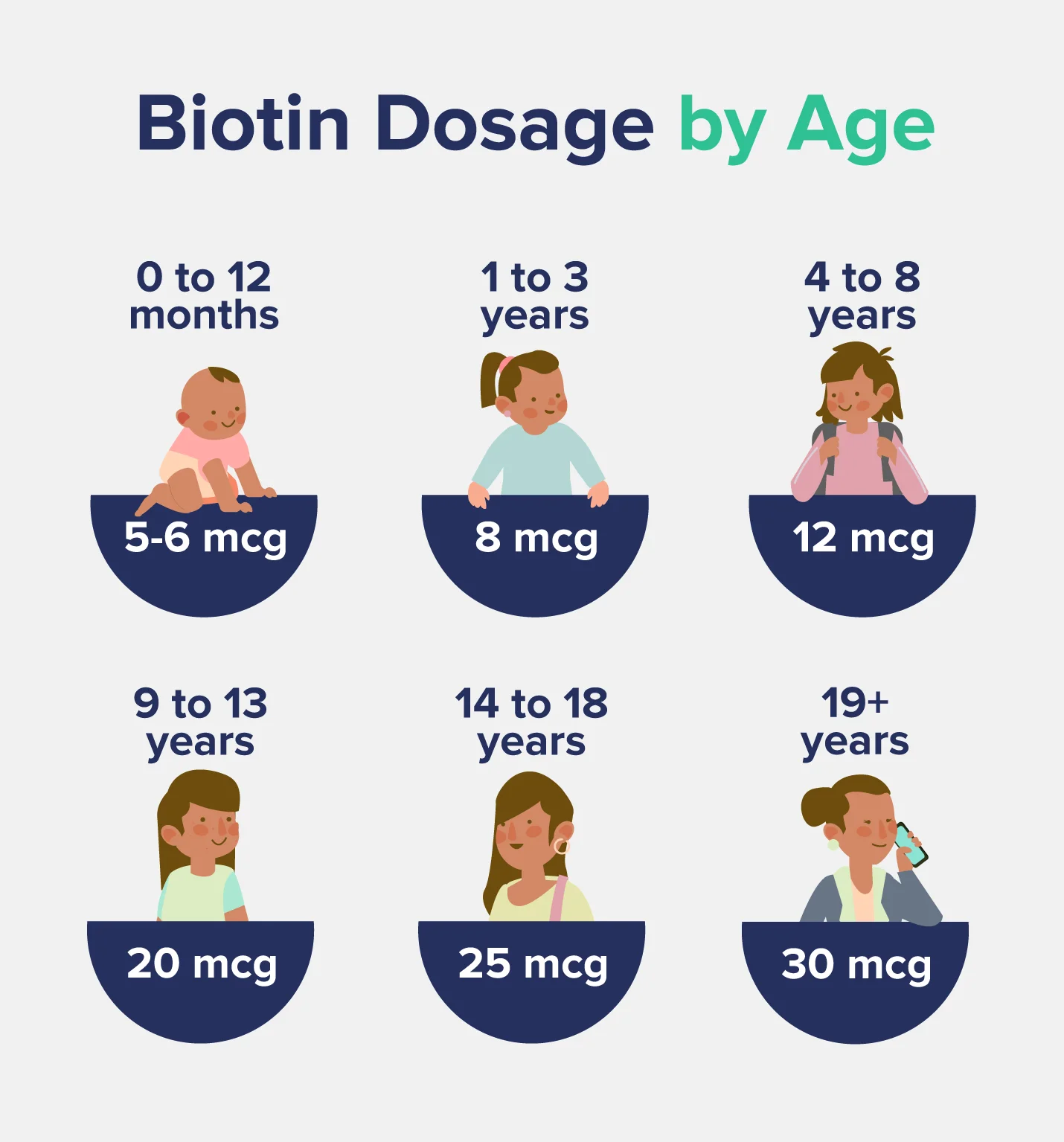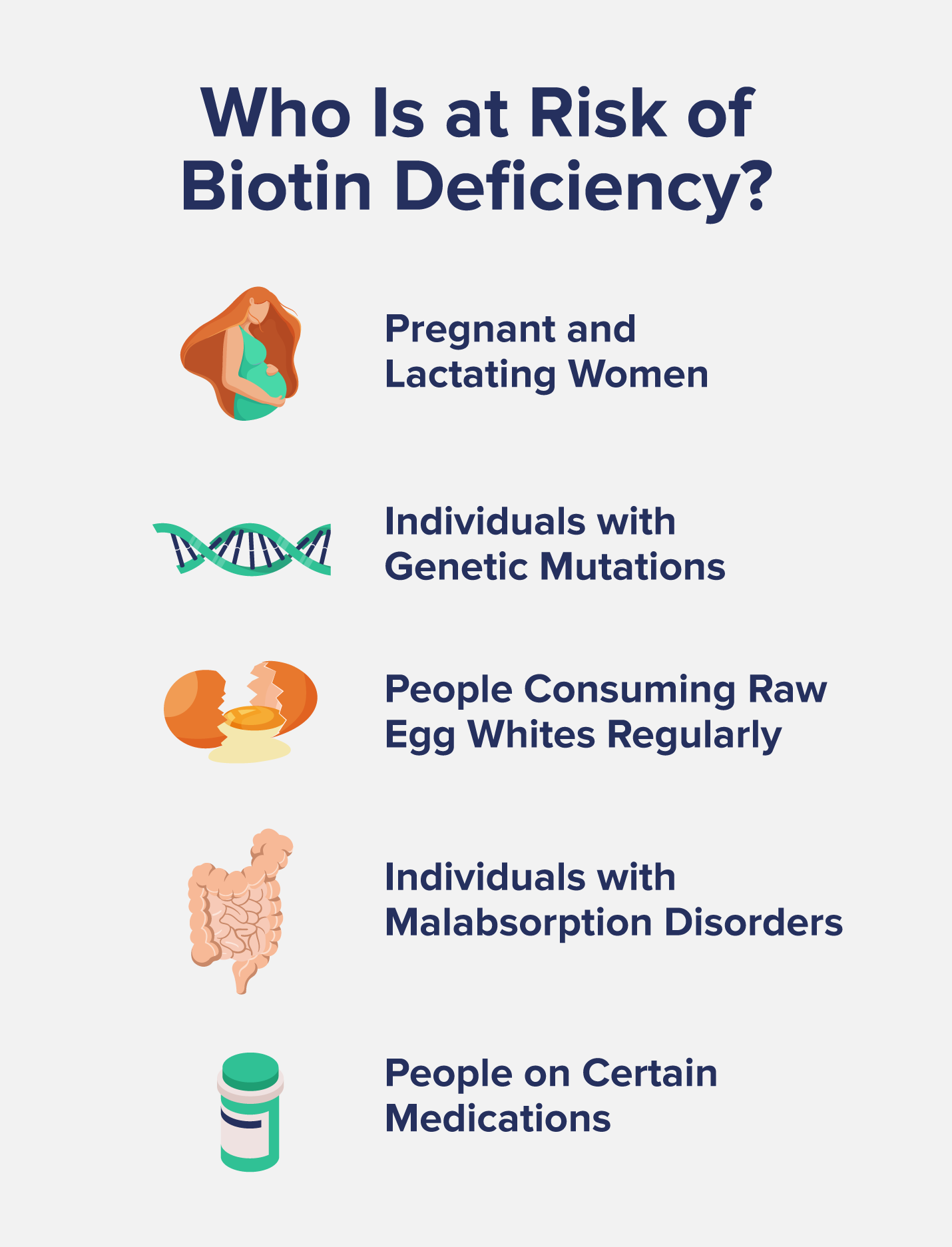Talk to a Registered Dietitian and use INSIDER20 for 20% off!
Talk to a real Dietitian for only $99: Schedule Now
This post contains links through which we may earn a small commission should you make a purchase from a brand. This in no way affects our ability to objectively critique the products and brands we review.
Evidence Based Research To fulfill our commitment to bringing our audience accurate and insightful content, our expert writers and medical reviewers rely on carefully curated research.
Read Our Editorial Policy
If you’ve ever taken a supplement designed to support healthy hair or nails, it’s likely that high doses of biotin were a main ingredient.
Biotin (vitamin B7) is an essential B vitamin that helps to break down the protein, fat, and carbohydrates in the foods we eat—but it’s most well known for its purported role in supporting hair and nail growth.
While there isn’t much solid evidence for the use of supplemental biotin in those without a deficiency, many people anecdotally report improvements in hair and nail health when taking them.
However, biotin supplements can vary widely in dosage. So, how much is too much, and conversely, how much do you need to take to see results? Let’s find out.
The Food and Nutrition Board has set either an RDA (Recommended Dietary Allowance) or AI (Adequate Intake) for vitamins and minerals.
The RDA is the average daily nutrient intake level needed to meet the requirements of 97-98% of healthy adults.
The AI is an intake level that is assumed to be nutritionally adequate for most people, but the available evidence is insufficient to develop an RDA.
The Food and Nutrition Board has not found sufficient data to set an RDA for biotin, which is why you’ll only see AIs for this nutrient.

While the AI for adults is 30 micrograms (mcg) per day, many supplements contain much more.
Unlike the fat-soluble vitamins (A, D, E, and K), biotin is a water-soluble vitamin, meaning it will be excreted once your body is replete with it.
There is no UL (Tolerable Upper Intake Level) for biotin, as toxicity or adverse effects from taking this vitamin have never been reported.
The UL is the maximum intake level of a nutrient that has been determined unlikely to pose a risk of adverse effects in humans. However, the key word is “unlikely”—upper intake levels cannot take into consideration every population and health condition.
Although toxicity is not reported from biotin, some people experience mild side effects like nausea and digestive issues, especially at high doses.
Plus, biotin megadoses are known to cause breakouts in acne-prone people—often doing the opposite of what a biotin-loaded skin health supplement claims. This may happen because biotin increases keratin production, and hyperkeratinization is critical to acne development.
Lastly, consuming more than the recommended daily amount—just 30mcg for adults—can cause false results in some laboratory tests, including hormone, thyroid, pregnancy, and vitamin D tests.
The average dietary biotin intake from food in Western populations is about 35–70 mcg per day, which is above the AI levels for biotin consumption.
As you can find biotin in many foods, including meat, fish, eggs, nuts, seeds, sweet potatoes, and beans, most people consume adequate amounts of biotin in their typical diet.
Therefore, biotin deficiency is rare in the United States—although it can cause thinning hair, skin infections, hair loss, brittle nails, skin rashes, fatigue, and nervous system disorders if it does occur.
If you don’t consume enough dietary biotin (or another B vitamin), taking a B complex supplement that contains biotin may benefit cellular function, energy levels, mood, and nerve health.
Like many other B complex vitamins, biotin is involved with gene regulation, cell signaling, and promoting the metabolism of fatty acids, glucose, and amino acids.
However, some people are more likely to become biotin deficient, including pregnant or lactating women and those with genetic mutations causing changes in biotin metabolism.
People who consume large quantities of raw egg whites can also experience biotin deficiency, as the whites contain a protein called avidin that binds tightly to the vitamin and prevents biotin absorption (cooking the egg white denatures avidin, so people who eat lots of cooked eggs don’t have to worry).
In cases of biotin deficiency, daily biotin supplementation is certainly recommended.

Most people do not need biotin supplementation unless biotin intake is low. Biotin supplementation may help promote nail strength or growth. However, this is supported by only a few case reports and small older studies.
For example, a small study from 1993 found that 63% (22 of 35) of participants showed clinical improvement in brittle nails when taking biotin for six months, although the dosage given is unknown.
Some evidence suggests that biotin stimulates keratin protein production and can increase the rate of follicle growth, which would be supportive for hair strength and growth.
In a 2017 review of 18 studies on biotin and hair or nails, people with biotin deficiency, brittle nails, or uncombable hair syndrome (yep, that’s a thing) saw benefits from taking biotin, while the healthy population did not.
Larger and more recent studies on biotin and nail strength have yet to be performed. It’s possible that taking biotin supplements may only benefit hair or nail growth if the person has a biotin deficiency.
Biotin is also essential during pregnancy, as it’s necessary for embryonic growth.
Over one-third of pregnant women can develop marginal biotin deficiency during pregnancy due to changes in biotin metabolism, so doses of 30mcg are recommended during this time.
Excess biotin (over 35 mcg/day) is not recommended during pregnancy or lactation, as it can be dangerous to the baby.
The AI for biotin for adult women is 30 micrograms (mcg) per day unless she is lactating, in which case it increases to 35mcg per day. Pregnant women may experience marginal biotin deficiency and may need to take supplemental biotin.
The research on biotin and hair loss or growth is outdated and inconclusive. However, many people anecdotally report that biotin supplements help with hair health. While excessive biotin is likely safe and unlikely to cause serious side effects, it can interfere with lab tests and can lead to acne breakouts.
The most recent study—a systematic review from 2017—concluded that there is a “lack of sufficient evidence for supplementation in healthy individuals.”
However, people with biotin deficiency or hair/nail disorders (like brittle nails or uncombable hair syndrome) may see benefits from taking biotin.
Similarly, another 2017 article states that there needs to be more clinical evidence, and the use of biotin to improve hair quantity or quality is not routinely recommended.
As the AI for biotin is 30mcg for most adults, 10,000mcg is excessive and likely will not do anything extra for your hair or nail growth. So, while it’s not unsafe or toxic, taking 10,000 micrograms of biotin is simply unnecessary. Plus, this amount will almost certainly cause breakouts in acne-prone people.
Although there is no scientific evidence on the amount of biotin to support hair growth or healthy hair, supplements containing up to 500 micrograms of biotin may help—but only if you’re low or deficient in biotin.
However, most biotin supplements contain much more than this—often reaching or exceeding 5,000-10,000mcg. These biotin megadoses are unnecessary for the majority of people.
Good sources of biotin include:
• Beef liver
• Egg yolks
• Beans and legumes
• Salmon
• Pork
• Tuna
• Sunflower seeds
• Sweet potato
• Almonds
• Mushrooms
• Avocados
• Nutritional yeast
Biotin is not known to produce significant adverse side effects, although taking too much biotin is known to cause acne in some people.
Some people experience mild side effects like nausea and digestive issues, and consuming more than the recommended daily amount can interfere with laboratory test results, including thyroid function tests, vitamin D, pregnancy tests, and other hormone tests.